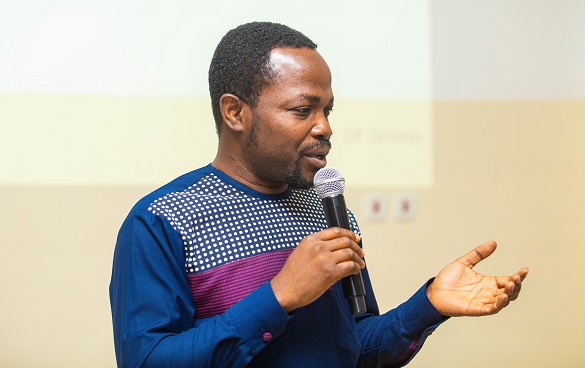Ghana needs evidence based policies to drive development – ISSER
The Coordinator for the Data Repository and Advocacy for Policy (DARAP) project of the Institute of Statistical, Social and Economic Research (ISSER) of the University of Ghana, Dr Fred Dzanku, has stressed the need for a stronger linkage between research, policy and implementation to drive Ghana’s development, particularly in the area of agriculture.
He said data “is important for decision making” and that there cannot be any proper planning without data, arguing that “that is why governments spend a lot of money on census.”
“So, if you implement policies that are based on research, those policies are most likely to be impactful,” he said, pointing out that many policies in the country are not based on evidence, resulting in very little or no impacts at all, from such policies.
Dr Dzanku made the remarks in an interview with Graphic Online on the sidelines of a one-day stakeholder engagement meeting on how data can be used to drive Ghana’s agriculture at the University of Ghana on Wednesday, November 30, 2022.
The stakeholders’ engagement meeting, which bropolicymakers researchers, civil society actors and policy makers, was on the theme: “Data Repository and Advocacy for Policy (DARAP): Science communication for policy forum.”
DARAP
The goal of the DARAP project is to build the capacity of civpolicy-makingganisations and academics to influence policy making processes and outcomes through the effective use of data and knowledge products, and the communication of research findings for advocacy.
More specifically, the DARAP project seeks to establish a data repository to build the capacity of NGOs, CSOs, and researchers to share data, research, and information for policy advocacy and influence; to utilise the data repository and existing research outputs to create new knowledge products as input for policy advocacyPhD influence, as well as to build the capacity of Ph.D students and young researchers doing agri-food systems-related work.
Among the topics discussed at the forum were aragri-foodfic evidence and the policy-making of agric-food systems policies and policy making”; “Ensuring food safety and quality from modern and conventional production systems”; “Building resilient food systems in the face of value-chain disruptions”, and “Communicating research evidence: Bridging the science action gap.”
Data
Dr Dzanku explained that the developed world had relied mainly on data to draw their development policies and implementation plans and that Ghana and other African countries cannot ignore data in development planning.
He noted that researchers use data to generate evidence and the evidence is supposed to guide both private and public policy, expressing the concern that oftentimes, how research information is communicated does not create the needed understanding to generate the needed response.
For him, when research is not well communicated to those who are supposed to use it, it will make no impact, hence the need for the DARAP project to find best possible ways to communicate research findings effectively to key actors to enable policy and implementation.
Dr Dzanku said the project will help to bridge the gap between researchers and those “who do advocacy,” stressing that when Civil Society Organisations (CSOs) and Non-Governmental Organisations (NGOs) get data from researchers, they will be able to do advocacy with it to attract government’s attention.
The DARAP Coordinator said researchers do not do research for research’s sake but that researches conduct studies that “a policy maker will be interested in it.”
Why agriculture
Touching on why the project focuses more on agriculture, Dr Dzanku said food has become one of the leading drivers of the country’s inflation, hence the need to focus more on agriculture to stem the tide.
“Agriculture is perhaps the single most important sector that we think that if we focused on can drive our economic transformation and also be able to dampen our inflationary pressures,” he said.
Declining trend
For her part, a Researcher with ISSER, Dr Dzifa Torvikey, said even though in terms of employment, the agricultural sector is still the top employer, the sector’s contribution to employment and the general economy—GDP, has been declining since the 1960s.
She said Ghana needed structural changes in its agricultural policies to address the various challenges that have confronted the sector.
She is of the view that over the years, government policies have focused only one side of the agricultural process in what she describes as “input drive” agriculture.
Dr Torvikey said the government has prioritised inputs such as fertilizers to other areas that also needed critical attention such as processing, storage, value addition, marketing and transportation.
“We have focused more on fertilizers which is import driven. What it means is that we spend a chunk of our budget importing these fertilizers and so our monies don’t in the country,” she noted.
She said, for instance, that access to land is a major challenge confronting many Ghanaian farmers which needed to be addressed if the country is to make any meaningful impact in the agricultural sector.
For Dr Torvikey, a systems approach to agriculture will help the country to find solutions to its major setbacks in the agricultural space.



